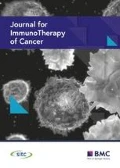Background
Immune editing is a major mechanism used by tumors to promote its survival. We have reported previously the presence of a novel phenotype of immunosuppressive monocytes (CD14+HLA-DRlow/neg) in a number of cancers. Increased presence of these cells was associated with decreased treatment response and OS. We have demonstrated that certain tumor cells can convert normal CD14+HLA-DR+ monocytes to CD14+HLA-DRlow/neg phenotype in an IL-10 independent and a tumor specific way. These CD14+HLA-DRlow/neg monocytes, in turn, protect tumors from cytotoxic killing from chemotherapy. Here we report up-regulation of heat shock protein-27 (HSP27) as one mechanism mediating this effect.
Method
Monocytes from healthy donors were co-cultured with lymphoma cell lines (OCI-Ly3, Jeko-1, and Granta-519) with or without Doxorubicin (DOX). Cultured cells were assessed for phenotype, viability and proliferation by flow cytometry. Lymphoma cells were isolated with anti-CD19 immunomagnetic beads and assayed by immunoblot for expressions of proteins regulating apoptosis. HSP27 levels in human plasma were measured by ELISA.
Results
DOX incubation induced apoptosis and decreased viability of all three cell lines; and co-culture with monocytes improved the lymphoma cell survival (for example, untreated Granta-519 had a 2.1 ± 0.45 fold expansion, that was reduced to 0.39 ± 0.12 when treated with DOX and 0.81 ± 0.27 after co-culture with monocytes with DOX. p < 0.05, n = 11.) Co-culture with monocytes induced increased HSP27 expression in lymphoma cells. HSP27 levels were further increased in co-culture with monocytes and DOX, with corresponding decrease in cleaved Caspase-3 levels. As tumor cells can secrete HSP27, we found detectable levels of HSP27 in plasma of lymphoma patients. Increased HSP27 in plasma correlated with increased proportion of CD14+HLA-DRlow/neg monocytes in blood.
Conclusions
We have found that monocytes may promote lymphoma resistance to DOX killing by inducing increased HSP27. In turn, HSP27 from lymphoma patients may induce immune suppressive phenotype in monocytes. Together, this data demonstrates an active cross talk between monocytes and lymphoma resulting in multiple mechanisms of tumor resistance to chemo-immunotherapy.
Author information
Authors and Affiliations
Rights and permissions
This article is published under an open access license. Please check the 'Copyright Information' section either on this page or in the PDF for details of this license and what re-use is permitted. If your intended use exceeds what is permitted by the license or if you are unable to locate the licence and re-use information, please contact the Rights and Permissions team.
About this article
Cite this article
Zhang, Z., Bulur, P., Gustafson, M. et al. Lymphoma monocyte crosstalk via HSP27 to promote immune suppression and chemotherapy resistance. j. immunotherapy cancer 2 (Suppl 3), P222 (2014). https://doi.org/10.1186/2051-1426-2-S3-P222
Published:
DOI: https://doi.org/10.1186/2051-1426-2-S3-P222

